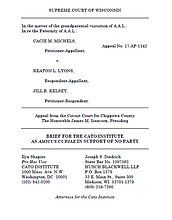Complicating matters, the U. S. Supreme Court has held that these familial relationships have a constitutional dimension. In the 2000 case of Troxel v. Granville, the Court struct down a Washington State law that granted grandparents visitation rights when to do so would be in “the best interests of the child.” This standard was constitutionally infirm, the Court held, because parents have important rights that cannot by overcome by a bare showing that the child would be better off being raised by someone else. As the late Justice Antonin Scalia pointed out, a great number of children should be taken from their homes if the question is whether someone else might do a better job raising them. Wisconsin’s statute is somewhat different than the Washington law, in that it requires a greater showing before invading the parent’s decision-making. The question for the Wisconsin Supreme Court is whether that’s different enough to shift the constitutional calculus.
Cato has filed an amicus brief, without taking a position as to which member of the family should prevail in this very personal dispute. Instead, we concern ourselves with the standards the court should apply. There’s a longstanding dispute about the source and extent of constitutional rights not explicitly set out in the constitution’s text (or even if they exist at all). The parental rights the U.S. Supreme Court previously recognized are of this type: there’s no specific clause that specifies that parents are entitled to direct the upbringing of their children, but the Court has (correctly) recognized such a right as an inherent feature of liberty. Cato’s brief argues that this understanding should be expanded, to recognize that it is not only the parent’s liberty that matters here, but also that of the child. We draw on the original understanding of the Fourteenth Amendment, in particular the Privileges and Immunities Clause, which while having fallen into disuse was intended to be the guarantor of such rights. We urge the Wisconsin Supreme Court to address the full scope of citizen’s constitutional liberties in considering Ann’s fate.
